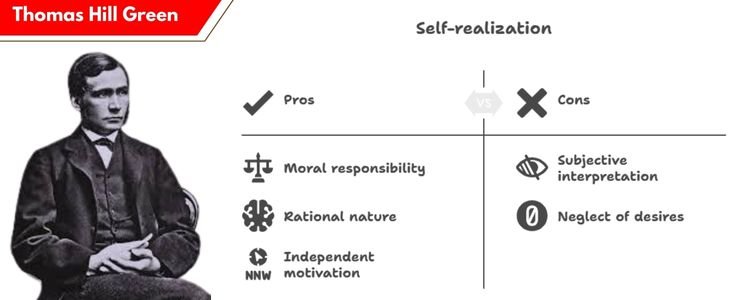Thomas Hill Green rejects hedonism and argues that the true moral good lies in self‑realization—the exercise of deliberative capacities that make moral responsibility possible. The self isn’t just a bundle of desires, but a rational, self‑reflective agent capable of endorsing, resisting, or reshaping those desires through deliberation. This makes self‑realization a categorical imperative, rooted in agency rather than fleeting inclinations. Because it reflects one’s rational nature, it has unconditional value and motivates action independently of pleasure or external desire.
Self-Realization as the Good
Green wants to argue not only against hedonism but also for self-realization. He suggests that it is the very capacities that make moral responsibility possible in the first place that determine the proper end of deliberation.
Responsible action involves self-consciousness and is expressive of the self. The self is not to be identified with any desire or any series or set of desires; moral personality consists in the ability to subject appetites and desires to a process of deliberative endorsement and to form new desires as the result of such deliberations. So the self essentially includes deliberative capacities, and if responsible action expresses the self, it must exercise these deliberative capacities that are essential to the self. This explains why Green thinks that the proper aim of deliberation is a life of activities that embody rational or deliberative control of thought and action.
One can ask about any conception of the good why one should care about the good, so conceived. Why should the good, so conceived, be normative? Green’s defense of self-realization makes the content of the good consist in the exercise of the very same capacities that make one a rational agent in the first place. This promises to explain why a rational agent should care about the good conceived in terms of self-realization.
This justification of self-realization also explains why Green treats the imperative of self-realization as a categorical imperative. Like Kant, Green seeks an account of the agent’s duties that is grounded in her agency and does not depend upon contingent and variable inclinations. The goal of self-realization, Green thinks, meets this demand.
At the same time, because it self-realization is the fulfilment of himself, of that which he has in him to be, it will excite an interest in him like no other interest, different in kind from any of his desires and aversions except such as are derived from it. It will be an interest as in an object conceived to be of unconditional value; one of which the value does not depend on any desire that the individual may at any time feel for it or for anything else, or on any pleasure that … he may experience.
On the contrary, the desire for the object will be founded on a conception of its desirableness as a fulfilment of the capabilities of which a man is conscious in being conscious of himself. … Self-realization will express itself in the imposition … of rules requiring something to be done irrespectively of any inclination to do it, irrespectively of any desired end to which it is a means, other than this end, which is desired because conceived as absolutely desirable.
Because the demands of self-realization depend only on those very deliberative Capacities that make one a responsible agent, they are categorical imperatives. Green recognizes that his conception of the good in terms of self-realization, perfection, or the exercise of deliberative capacities is abstract and perhaps vague in comparison with the apparent definiteness of the hedonist’s conception of the good. Moreover, he thinks that one is unable to specify fully the content of self-realization independently of its embodiment.
This claim may reflect Hegelian themes about the form of an individual, good being historically conditioned. It may also reflect the more familiar ideas that the perfection of one’s capacities is an ideal that one can at most hope to approximate and that any conception of perfection by imperfect beings must be defeasible. None the less, Green’s conception of the good in terms of self-realization or the exercise of deliberative capacities is not empty.

